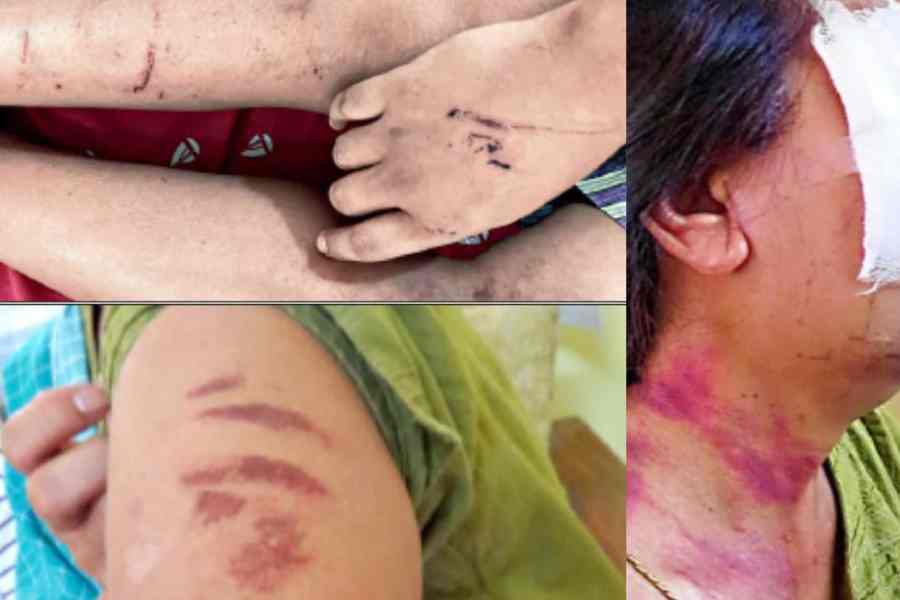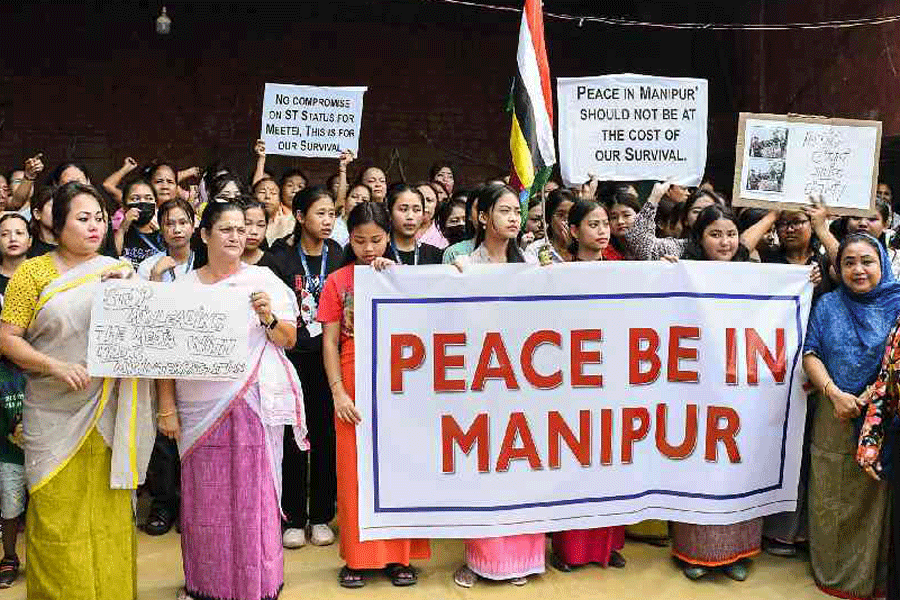Flights from Imphal are landing in Calcutta with victims of the strife in Manipur, most of whom have nothing on them except the clothes on their back. The clothes of some are soaked in blood and caked in dirt.
“The world is not getting to know the actual situation in Manipur. The authorities are pretending everything is under control,” a Calcuttan told The Telegraph over the phone on Sunday. Distant relatives of the caller, a member of the Kuki tribe, landed in Calcutta in the wee hours.
This correspondent met three members of the family of visitors on Monday. The following are excerpts from the accounts by Manggoulal, 30, his wife Tingneikim, 30, and his mother-in-law Ngaikholhing, 59. Their surnames and specific locations in Manipur have been withheld on their request. Manggoulal spoke the most, with Tingneikim interjecting from time to time.
We caught the first whiff of trouble on May 3 around 5pm from a news bulletin and rushed out to buy essentials. Police were asking people to keep their doors shut. The sun had just set. Soon, we heard tear gas shells being burst and shots being fired. We could also see smoke in the streets.
Our house is in a market area and there is the Kuki Baptist Church close by. We sat in the dark, with all lights switched off, watching our church go up in flames. We carried our 91-year-old grandmother upstairs. Calls started coming, reporting deaths and houses being torched. A neighbour living next to a Mizo Presbyterian church forgot to lock his door. His house got looted and partially burnt. They hid in a room and survived. The next morning, when calm descended, we went out and saw the destruction.
We kept calling all emergency numbers that we had, pleading for security. Finally, we got through to a major and sought an escort to evacuate. Two Gypsy vehicles came from the Assam Rifles (AR), full of their own men. We were told to come in our own vehicles. Driving private vehicles was unsafe, we argued. But they would not listen.
So 20 of us, relatives and neighbours, set off in three private cars, packing whatever we could carry, with the army vehicles bringing up the front and rear. We also picked up some people who spoke our language and sought our help.
We reached Hatta, a diverse locality, and our convoy was stopped for over half an hour. We saw people speaking in the Meitei (the majority community) language and taking our pictures. We panicked and urged the AR personnel to proceed or return to our area.
When they let us move again, we could feel we were being watched.
I kept gesturing at the AR car in front to move faster — it was travelling apparently at 45kmph — but it would not. Soon, we were stopped by a mob of about 200 people. The AR officials told them: “Army ka family hai (They are army families).”
“Toh kya hai, Kuki hai (So what, they are Kukis),” the crowd shot back and deflated the tyres of our three cars.
A two-year-old was in our car, my mother-in-law was behind me and my wife sat in the front next to me. They asked us to get off the car. An AR official signalled us not to. The mob was carrying stones, iron rods and knives. They smashed the windscreen. The splinters were all over my wife and me. A stone caught my mother-in-law under the eye. Blood squirted like water from a pipeline. The baby was crying.
The AR guy asked me to drive back. I put the car in reverse gear and drove in a daze through the mob. We spotted my elder brother and his wife, who were in another car, being dragged into an AR vehicle, which drove away. Our grandmother and our neighbour were pulled out of the other car by the mob.
Now the attention was on us. There was nowhere to escape. My wife pulled the handbrake and we stepped out, with our hands up. A guy hit me with a bamboo stick. I fell down and saw my mother-in-law coming out, with blood all over her. As we cried for an ambulance, they kept hitting my wife and me with wooden planks and rods. We could smell alcohol. I tried covering my face with my hands.
We hugged each other, ready to die, telling ourselves that we would not die in hate. My mother-in-law tried to take out her jewellery. The moment they saw that, they flipped our car and torched it. Our throats were dry and hoarse. My mother-in-law was puking blood. They tried to snatch her bag but when she tried to resist, a man kicked her and she fell into the burning car. Her clothes caught fire. My wife pulled her out. See the blisters on her hands! Our phones were taken away. They were itching to kill me and a guy who was in our car. He had been hit with a catapult and lost the skin over his upper lip.
At this point, some people from the same Meitei community as the attackers rescued us and took us to a school. We met our family members from the other cars there, including our asthmatic grandma, gasping for breath. Luckily, her inhaler was with her.
At this point, some people from the same Meitei community as the attackers rescued us and took us to a school. We met our family members from the other cars there, including our asthmatic grandma, gasping for breath. Luckily, her inhaler was with her.
After some hours, two buses came. They were full of Meitei men who started hitting the wall. They could not kick the door open as Meitei women were guarding it. They broke a wooden window and started shooting catapults through a gap. My grandma does not see well. We gave her a plastic chair to hide behind. They could hear the baby cry as her father covered her.
The attackers retreated after a while as we heard the women shouting: “Kill us first before you kill them.” Their own community’s women! Those women could not have eaten or taken a sip of water for hours as leaving their post would have meant death for us. The men kept coming back every half-hour or so, trying to make their way through the cordon of women.
We kept praying inside and sought forgiveness for them. We could hear the mob shouting: “These are the people who rape us and kill us! Let’s attack another area.” Fake news had been circulated on social media.
It was dark by then, which was the best time for the mob. We could hear the people who were protecting us moving away in their cars. One of the Meitei women entered in tears, with water and other provisions, seeking our forgiveness. They said they would be killed if they stayed on.
But later at night, a man came with a gun. We thought he would kill us. But his body language was different. When he asked us in an undertone to step out, we did. There were a few other gunmen with him. They led the 20 of us into a cottage in a hilly farming area about a kilometre away.
“Let’s stop this war,” they told us. “If you can escape, please spread the news that not all Meitei people want this. This is a political matter. If you see our people in trouble, help them.”
We could now browse social media on others’ phones and saw the matter had been turned into a religious war, which it was not. I am not specifying the area as I do not want our rescuers to be identified.
They took us later to an AR camp where thousands were sleeping in the open in the rain. The children and the old were kept under sheds. But since our mother-in-law was in bad shape, they took us to the camp’s health unit, which had nothing except cots and one doctor. Patients and nurses from a local hospital had also taken shelter there as the mob had targeted the hospital in search of Kukis. Those nurses had brought some medicines and were volunteering here.
There was rice and dal from the canteen but nothing more. We had no money. Others, who had managed to bring some money, gave us some.
The next day our family members outside Manipur managed to pay for our air tickets. But there was no seat confirmation. Extra flights are operating but ticket prices are shooting through the roof — Rs 20,000 to Rs 25,000.
A message came to us to go to the airport. An escorted AR vehicle took us but there was a queue of over 1,000 people there too. We were told that we would get space if people with confirmed tickets did not turn up. Our first attempt to get on a 4pm flight failed. The second Calcutta flight was at 12.20am. We got lucky and landed here. We reached our relative’s place at dawn.
A day has passed here. Yet, when we hear the screams of kids playing outside, it sends a chill down our spine.











